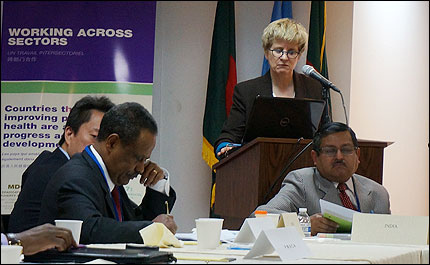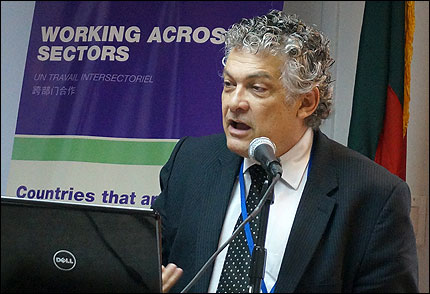New York, USA — The Permanent Mission of Bangladesh to the United Nations, Partners in Population and Development (PPD) and The Partnership for Maternal, Newborn & Child Health (PMNCH) co- hosted a breakfast meeting in New York in support of Every Woman Every Child focused on the topic of “Putting People’s Health at the Center of Sustainable Development”.
The meeting which took place on the side of the 47th Commission on Population and Development (CPD), brought together ministers of health, senior officials from Member States and key partners including WHO, UNFPA and IPPF. It was an opportunity to take forward the findings and deliberations of the recently concluded ICPD operational review and give Member States an opportunity to review progress, gaps, challenges and emerging issues in relation to the ICPD Programme of Action. PPD countries represent over half the world’s population, have the largest youth population, and are grappling with aging while at the same time dealing with development challenges among other things. The event also celebrated the twentieth anniversary of PPD.
The Permanent Representative of Bangladesh, H.E. Mr. A.K. Abdul Momen chaired the meeting and during his intervention reiterated the commitment of Bangladesh for continued support to PPD on its 20th anniversary. He emphasized the importance of investing in health and education for sustainable development, as opposed to areas such as defense which he said consumed disproportionate resources, without contributing to development. He recounted the contribution of PPD to move this ICPD agenda forward within its member countries and in other international fora underlining the spirit of South-South Cooperation.
Dr. Joe Thomas, Executive Director PPD, recalling the twentieth anniversary of the organization gave a brief overview of PPD’s history and its intimate association with ICPD POA. He flagged a few key issues for PPD countries to note, such as supporting sexual and reproductive health services and rights, paying attention to key groups such as adolescents, as well as the role of aging and migration in the development agenda of these countries. He pointed out that in developing countries, unlike in the developed world, aging of the population is occurring even before the countries are economically developed, which makes south-south learning critical. He was proud to underline that PPD is now moving from being a donor funded partnership to one that is Member State funded, and therefore sustainable.
H.E. Mr. Matia Kasaija, Minister of State for Finance, Government of Uganda also echoed the sentiments of Bangladesh by also reaffirming his country’s commitment to PPD. He however stressed that despite making considerable progress, several major challenges still remain. He commended PPD for its untiring efforts and contribution to support the member countries in implementing the ICPD agenda.

From the left Dr. Tewodros Melesse, Director General, IPPF, Ms. Kate Gilmore, Deputy Executive Director, UNFPA and Mr. Lov Verma, Secretary, MOHFW, Government of India at the breakfast meeting
Ms. Kate Gilmore, Board Member, PMNCH and Deputy Executive Director, UNFPA, spoke about the critical role of the Cairo Consensus in putting people and human rights in the center of the development agenda. She reminded the gathering that sexual and reproductive health and rights (SRHR), is an integral part of human rights and inclusive development. She discussed SRHR in the context of adolescent health, stressing the importance of reaping the demographic dividend for PPD countries through investments in health including sexual reproductive health, education and employment opportunities for young, and the pivotal role that South-South collaboration plays in the present and future. She highlighted the economic, social and environmental returns of such investments and the fact that countries need to take a multi-sectoral approach to achieving sustainable development.
Mr. Lov Verma, Secretary, MOHFW, Government of India outlined the comprehensive nature of the RKSK (Rasthriya Kishore Swasthya Karyakram – or National Adolescent Health Program) which covers not only SRH, but malnutrition, substance abuse, mental health, communicable and non-communicable diseases, and violence including gender-based violence. He noted that research shows about 33% of the disease burden and 60% of mortality in later years is rooted in adolescence. He talked of the importance of reaching adolescents in their own spaces and described the magnitude of the program in terms of health system needs (over 3.6 million peer educators and counsellors will be linked to 900,000 ASHA workers in the coming years). The program, he explained, is based on multi-sectoral collaboration and brings together many stakeholders for planning, implementation and monitoring.
The Bangladesh State Minister of Health and Family Welfare, Mr Zahid Maleque, highlighted some of the achievements of Bangladesh in reducing poverty and achieving high economic growth in a pro-poor policy environment. His intervention focused on ways to empower women through skills development, provision of credit facilities and social safety nets, pointing out that Bangladesh has a net school enrollment of 99.5% (of which 53% are girls). He went on to explain that this was achieved through a mix of policies such as school feeding, provision of free text books, stipends for girls, among other things. He also acknowledged that several major challenges remain including malnutrition (particularly stunting), deliveries by unskilled providers, child marriage and vulnerability to natural disasters. He commended the contribution of PPD in advocating and supporting the ICPD follow up in its member countries. He reiterated his countries full confidence and commitment to support the mission and role of PPD.
Mr. He Zhaohua, Deputy Director General of the Department of Family Development, the National Health and Family Planning Commission of China hailed PPD as an important platform in South South Collaboration, particularly for a country like China with the world’s largest population. He spoke of China’s long association with PPD and how the country has already committed over $2 million in commodities, training and technology to follow population trends.

Mr. Ricardo Paes de Barros, Undersecretary of National Committee on Population and Development of Brazil
The Undersecretary of Brazil’s National Committee on Population and Development, Mr. Ricardo Paes de Barros spoke of the strides Brazil is making in improving the health of its population by adding one year to the population’s life expectancy every two years. The country, however, is still struggling to reduce its MMR and teenage pregnancy which is a major concern, and he acknowledged the role of Commission on Population Development in helping countries learn from each other’s experiences. The Undersecretary also pointed out that even though South-South collaboration is not a replacement for ODA, it can make a significant difference on the ground.
Dr. Tewodros Melesse, Director General, IPPF, concluded the interventions by urging Member States to use the opportunity of the CPD to ensure that the rights of women and youth are protected as stated and agreed in the Human Rights Declaration.
A people centered, rights based approach to sustainable development that the ICPD set forth is as true today as it was 20 years ago. South-South collaboration is a powerful addition to ODA in terms of knowledge sharing, technology transfer and financial support in making this a reality
About PPD
Partners in Population and Development (PPD) is an intergovernmental alliance comprising of 26 developing countries. This alliance provides the mechanism to promote partnership and cooperation between the member countries, towards achieving the goals of the International Conference on Population and Development (ICPD), Programme of Action (PoA) and also the Millennium Development Goals (MDGs). It holds a status of Permanent Observer status at the United Nations General Assembly.
The current member countries of the Alliance are, Bangladesh, Benin, China, Colombia, Egypt, Ethiopia, The Gambia, Ghana, India, Indonesia, Jordan, Kenya, Mali, Mexico, Morocco, Nigeria, Pakistan, Senegal, South Africa, Sri Lanka, Thailand, Tunisia, Uganda, Vietnam, Yemen and Zimbabwe. The PPD member countries cover more than 57% of the global population. www.partners-popdev.org
PPD MEDIA CONTACT
Masuma Billah, Advocacy and Communication Officer
+88 01716 011683
masuma@ppdsec.org
Skype: masuma.billah
